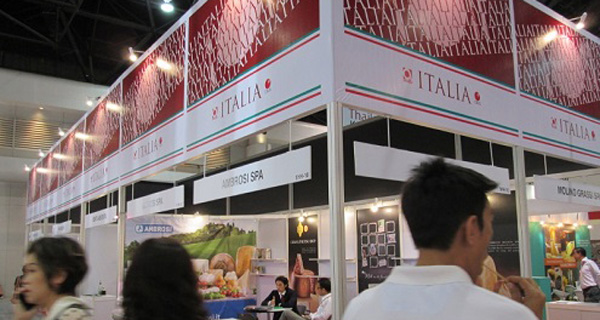
From now on, China will be ‘closer’ to Italian food. The participation of 50 food&beverage players in the Italian zone at World of Food Beijing 2014 – born from the collaboration between Anuga (Koelnmesse) and Cibus (Fiere di Parma and Federalimentare) – represented an important opportunity to gain access through the front door to the large market of northern China, an area still little explored, but offering enormous potential. The numbers speak for themselves: by 2018 China will become the World’s biggest consumer of imported food at an estimated value of 80 billion dollars. Beijing, in particular, is the region which has shown the highest growth rate with 7.66 million dollars in 2012 (+53% vs ap) compared to Shanghai’s 6.52 (+20%). “Beijing”, explains Thomas Rosolia, Managing Director of Koelnmesse Italia to Foodweb “is a city ready to welcome food and drink from overseas markets. The focus on food security of the population at the middle to high end of the market will facilitate the import of premium foods, for example the authentic Italian products.”
The exhibitors’ aim is to start to explore the market of 200 million potential consumers by way of promotion campaigns and food education programmes. In China the notion of “Italian sounding” is well established and the real challenge is to make the retail buyers, and also the restaurant chefs, understand the difference in quality between the imitated products and the original authentic products. Paolo Coppini, owner of the oil company of the same name, tells us that “Beijing is a strategic city-state to understand the cultural evolution of the population and to consolidate presence in the whole country, defending the made in Italy mark is a difficult but crucial mission for our products”. To this end, the company has launched a campaign in China’s National Geographic regarding the traceability of extra virgin olive oil.
Diego Pariotti, export sales director for Conserve Italia, also considers the macro region of northern China an opportunity which should be seized, even though it is culturally a lot less ready to receive imported food in respect to other more mature areas: “Consumption of tomato sauce is gradually increasing even if it remains only a niche in the market for the moment. The main focal point is still Shanghai but we have faith in a positive trend in Cirio sales, thanks to the strong presence in the large international retailers such as Carrefour and Auchan, as well as in the local premium product chain Jenny Lou’s and a number of preliminary phase e-commerce platforms such as JD and YiHaoDian.”
For a producer of rice it is rather more difficult to increase the popularity of its products when considering the ban on importing the raw material to China. Riso Gallo, however, which only exports packaged risotto to China, is implementing a long-term commercial strategy. “In addition to being present in Metro China since 2002”, explains export manager Alejandro Titiunik, “since October this year our risottos are also being sold by Alibaba, where in few days there was a boom in sales with over 400 products sold.”
Asia is also supposed to become an ever more relevant area for another Beijing exhibitor, La Molisana, in intercepting new buyers and expanding its scope beyond Shanghai and Hong Kong. “For a business specialised in durum wheat products in a country where wheat or rice flour reigns, the great challenge is to adapt the authentic Italian product to suit local needs better. It is only by doing this that the gap between Italy and China will be reduced.”
